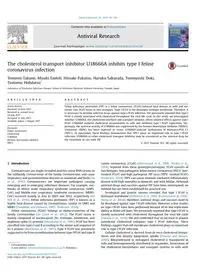
2017 The cholesterol transport inhibitor U18666A inhibits type I feline coronavirus infection PDF
Preview 2017 The cholesterol transport inhibitor U18666A inhibits type I feline coronavirus infection
The cholesterol transport inhibitor U18666A inhibits type I feline coronavirus infection Tomomi Takano, Misaki Endoh, Hiroaki Fukatsu, Haruko Sakurada, Tomoyoshi Doki, Tsutomu Hohdatsu* Laboratory of Veterinary Infectious Disease, School of Veterinary Medicine, Kitasato University, Towada, Japan a r t i c l e i n f o Article history: Received 14 June 2017 Received in revised form 24 July 2017 Accepted 31 July 2017 Available online 3 August 2017 Keywords: Feline coronavirus Cholesterol U18666A Histone deacetylase inhibitor NPC1 a b s t r a c t Feline infectious peritonitis (FIP) is a feline coronavirus (FCoV)-induced fatal disease in wild and do- mestic cats. FCoV exists in two serotypes. Type I FCoV is the dominant serotype worldwide. Therefore, it is necessary to develop antiviral drugs against type I FCoV infection. We previously reported that type I FCoV is closely associated with cholesterol throughout the viral life cycle. In this study, we investigated whether U18666A, the cholesterol synthesis and transport inhibitor, shows antiviral effects against type I FCoV. U18666A induced cholesterol accumulation in cells and inhibited type I FCoV replication. Sur- prisingly, the antiviral activity of U18666A was suppressed by the histone deacetylase inhibitor (HDACi), Vorinostat. HDACi has been reported to revert U18666A-induced dysfunction of Niemann-Pick C1 (NPC1). In conclusion, these findings demonstrate that NPC1 plays an important role in type I FCoV infection. U18666A or other cholesterol transport inhibitor may be considered as the antiviral drug for the treatment of cats with FIP. © 2017 Elsevier B.V. All rights reserved. 1. Introduction Coronaviruses are single-stranded positive-sense RNA viruses in the subfamily Coronavirinae of the family Coronaviridae, and cause respiratory and gastrointestinal diseases in mammals and birds (Su et al., 2016). Coronaviruses are important pathogens causing emerging and re-emerging infectious diseases. For example, out- breaks of severe acute respiratory syndrome coronavirus (SARS- CoV) and Middle-east respiratory syndrome coronavirus (MERS- CoV) occurred mainly in Asia in 2003 and 2012, respectively (de Wit et al., 2016). Feline infectious peritonitis (FIP) is known as a highly fatal disease caused by Coronaviruses, similar to SARS and MERS (Dandekar and Perlman, 2005; Pedersen, 2014). Feline coronavirus (FCoV) belongs to Alphacoronavirus of the family Coronaviridae (de Groot et al., 2012). The FCoV virion is mainly composed of nucleocapsid (N), envelope, membrane, and peplomer spike (S) proteins (Motokawa et al., 1996). FCoV has been classified into types I and II according to the amino acid sequence of its S protein (Motokawa et al., 1995). Type II FCoV was previously suggested to be from recombination between type I FCoV and type II canine coronavirus (CCoV) (Herrewegh et al., 1998; Terada et al., 2014). Separate from these genotypes/serotypes, FCoV consists of two biotypes: low pathogenic feline enteric coronavirus (FECV: low- virulent FCoV) and high pathogenic FIP virus (FIPV: virulent FCoV) (Pedersen, 2014). FIPV can cause immune-mediated inflammatory disease with high mortality in domestic and wild felidae. Although antiviral drugs and vaccines against FIP have been investigated, no method has yet been established for practical use. Serological and genetic surveys revealed that type I FCoV is dominant worldwide (Hohdatsu et al.,1992; Kummrow et al., 2005; Wang et al., 2014); therefore, antiviral drugs and vaccines need to be developed against type I FCoV infection. However, a few studies on type I FCoV have been performed because of its low replication ability in feline cell lines. We previously reported that type I FCoV is closely associated with cholesterol throughout the viral life cycle (Takano et al., 2016). We also confirmed that an increase in plasma membrane cholesterol enhances type I FCoV infection. These findings suggest that cell membrane cholesterol plays an important role in type I FCoV infection. Cellular cholesterol is derived from de novo cholesterol biosyn- thesis and low density lipoprotein uptake (Simons and Ikonen, 2000). Biosynthesized or entrapped cholesterol is transported in cells and heterogeneously distributed in organelles. Association of the cholesterol biosynthesis and transport systems in cells with * Corresponding author. E-mail address:
